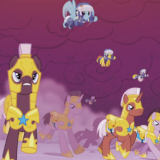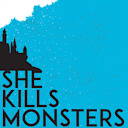
This story is a sequel to My Neighbor
In 1945, First Sergeant John Arrow liberated Dachau. Seventy-five years later, he sits down with Rarity and remembers the Holocaust.
Content advisory: contains explicit reference to genocide, but shies away from graphic descriptions of the precise atrocities.
This story is dedicated to those who suffered the horrors of the Holocaust, to those who survived and those who did not. In Memoriam.
It is also dedicated to those who have fought to prevent such evils from ever happening again. For any veterans or others living with that trauma, I've placed a link for the veteran helpline, a link for the suicide hotline, and link for international crisis lines. There is no shame in needing to talk to someone. No one should have to bear this alone.
Other stories in this canon:
My Neighbor
Their Neighbors
Public domain picture by Dorsm365 from Wikimedia Commons
Original characters are my own creation. My Little Pony and its contents are the property of Hasbro, Inc. and its affiliates. Please support the official release.
























I was not expecting this story, but it needed to be written. Thank you for doing so.
I just...
Wow.
I don't think I could put to words how good this is.
Not without a long rambling diatribe about myself and my experiences with WW2 history that nobody wants to read, anyway.
Excellent job, as always. I'm... gonna go reflect for a bit, I think.
I've really grown to like and admire Mr Arrow, especially the impact he has on our 8 friends.
I really like Mr. Arrow, so you can guess how delighted I was to read another story about him again. And this one doesn't disappoint. Pleasant with emotion, great characterization of Rarity and an honest, traditional charm that makes me adore this story.
Those who fail to learn from history are doomed to repeat it.
Let us learn.
10083202
10083232
10083376
10083384
Thank you!
10083764
Well said.
Me getting ready to read this when I realize I've never made the time to read the other two, and so now I get to read three really good and moving stories in one night instead of just one.
So, thanks! Cus I know it'll be good
You are a man who speaks truth, a rarity these days.
Even though the truth is brutal and ugly, it is a truth that needs to be said. Because if we forget the truth, the atrocities will continue to happen.
Thank you for writing this. The effort you put into this isn't for nothing.
We mustn't ignore the wolves, nor should we forget the sheepdogs. You reminded us of both.
Well, that's one heck of a start.
Very interesting history tidbits. I knew that there was a Polish soldier who actually volunteered to enter Auschwitz to gather information – nerves of titanium, that man – but I didn't know about Eisenhower.
So long as men exist, evil will never be extinguished.
And yet, as Charlie Chaplin said, so long as men die, liberty will never perish.
Hope springs eternal, after all, in spite of the cruelties of this world.
My great grandpa was among the first Americans to see one of these camps. Part of the spearhead, if I remember my terminology correctly.
He didn't open up about it until years later, when people started to publicly deny that the Holocaust had happened, but what he'd seen had torn him up inside until he died of Alzheimer's in the early 2000s.
I suspect many Americans have similar stories tucked into their family trees, which makes the notion of denying the Holocaust that much more bizarre to me.
I've heard of each of the genocides mentioned here, but never known what to do with that knowledge.
As long as there are people, some people will treat others as things; as means to an end rather than as sovereign beings in their own rights. But there will also be good people who see that happening and decide to do something about it. They won't always win, but I don't believe they ever lose permanently.
Thanks for writing this, and the rest of the stories with Mr. Arrow. You're helping us remember history by tying it to people and stories.
10084815
One of my best friend's grandfathers was a tanker who was part of the force that liberated Dachau. He also never spoke about it other than to say he'd done it. I think most soldiers who saw those camps have stories like him or your grandfather.
As to why Holocaust deniers exist... history, regrettably, is often revisionist, determined by what's in vogue and who's in power in academia. Think, for example, about what you learned about the Spanish in schools - probably very little of it was positive (at least if you had schooling like most American students get), but why is this? It has nothing to do with whether Spanish history was good or bad - it has to do with the Spanish Armada's failed attempt to invade England, English nationalism and the subsequent spin that was put on the story, and the enduring legacy of that revisionist spin that continues to haunt the teaching of Spanish history in most of the English-speaking world. This applies to both exaggerations of Spanish failings, neglect to mention Spanish successes, and the outright fabrication of myths, all of which are common "knowledge" in American schools.
For example: did you ever hear mention Queen Isabella banned the enslavement of Native Americans unless they were hostile or cannibalistic? That Native Americans were to be considered subjects of the Crown and thus entitled to legal protections? That Columbus was preempted from selling Indian captives in Seville, and those already sold were tracked, purchased from their buyers and released? Or about the subsequent efforts of multiple Spanish monarchs to either curtail or outlaw the trade? Probably not. Neither did I until I stumbled across it by accident. Imperfect and ultimately unsuccessful as these efforts were, they still deserve to be talked about, but they seldom are.
Ample documentation may exist to disprove common myths, but unless such documentation is presented boldly enough by enough influential people, it stays relegated to a select few. As a more topical example, Pope Pius XII (mentioned in passing in the story) actively tried to have Hitler assassinated and was responsible for seeing to it that thousands upon thousands of Jews were saved through secret networks run by Catholic religious (many of whom died doing it). Priests and nuns acted as spies, stole Nazi plans to send to the Allies, and fed the Nazis false reports while hiding Jews in convents and churches (sometimes disguised as nuns or monks), all at the pope's order. Prominent rabbis after the war routinely praised his efforts in saving their people, and Hitler himself considered the pope one of his greatest enemies.
But after Pius XII's death, the KGB wrote hit pieces about him (because the Catholic Church has long been a staunch opponent of Communism), accusing him of being in the Nazis' pocket. Ample documentation existed even at the time to disprove the hit pieces (and even more has been discovered subsequently), but the cry was taken up by Western academics. Soon the man who saved thousands of Jews was labelled "Hitler's Pope," a reputation he's never been able to outrun.
I could go on for pages about villains who are misremembered as heroes and heroes who are misremembered as villains and complex people who are pigeonholed as being one particular thing when the reality is more complex. Sadly, such bastardization is commonplace in the study of history, and many myths (like the general disdain for the Spanish in much of the English-speaking world) go back literal centuries, and thus are difficult to untangle even with evidence because the roots of the hostility run so deep.
Consider, now, how many powerful people hate Jews for one reason or another - hatred which has lasted for well over a millennia in some cases. Under those circumstances, revisionist history should not surprise us. Appall us? Yes. Motivate us to do better? Definitely. But we'll always be fighting revisionist myths - they are among the most subtle of wolves.
10084841
Honestly, one of the best things to do with the knowledge is to remember the stories and share them. Hitler once pointed out that no one remembered the Armenian Genocide (which had happened during WWI and is still not acknowledged by most countries, including the US). He noted that, if no one remembered a genocide only a couple decades old, they'd be able to get away with the Holocaust. Horrifyingly, he was almost right.
When we remember the stories and ensure that others do too, we strip away the power of men like Hitler to get away 'clean.' We might not be able to stop the genocides if our governments won't intervene, but we can keep the people alive in memory and speak truth to power. If people are raised with the knowledge of such profound evil, and of the good that can be done in the face of it, then we're more likely to see people stand up and do something about it when the time comes.
10084862
That was quite educational. I knew a little about Spain's opinions on slavery (thanks to a video series on the Haitian Revolution), but hadn't considered the glaring gaps in my knowledge on Spain in general.
10084862
A most striking account of the dangers of revisionist history.
They say history is written by the victors, and yet this shows that history is much more nuanced than one would think.
It's frustrating enough to hear of villains whose evil has been forgotten or denied, but it's more frustrating and sad to hear of heroes who've been misremembered. They all deserve their credit, good or bad, and yet the subject known as history isn't perfect and never will be.
They also say the past is set in stone, but even stone is eroded over time, and even when it isn't, the lens of bias does more than enough damage.
10085886
Ah, yes. The past itself may be set in stone. But people's memory of it? That's another matter.
First part took my breath away.
10090110
Well, that is the reaction I was going for... so... good?
10090231
VERY
You have a way of putting the reader there.
Speaking as a historian (and a priest, albeit of the Anglican faith, not a Catholic like the good Frere Jacques) myself, I've followed 14th Century Friar in Celestia's Court for a while and thought I'd check out some of your other works. I was not at all disappointed. This one was short, sweet, and to the point- very to the point.
10375126
Thank you kindly!
As it was noted before, this story is very, very to the point. The IRL human-ness of the names, locations, and verbatim insertion of our history into the land of skittle people is something that probably threw some readers off, even on the third installment. However, you write with sincere emotions and convey things tastefully. Thank you for writing this.
10518861
Thank you. I always like hearing that my IRL/skittles crossovers worked out for readers, especially when I'm trying to make an actual, serious point.
10519462
Well, please keep up the good work! I'll certainly be sure to look into reading 14th-century friar one day, when I'm not nearly so busy and can tackle a longer story.
10519464 It started as something I was doing for kicks, and then very quickly got out of hand. Thanks for the support!
It started as something I was doing for kicks, and then very quickly got out of hand. Thanks for the support!
Yeah, 14th C is a bit of a monster.
10519466
It's pretty dummy thicc, and I like a dummy thicc story but university and my own projects are a bitch.
Again, I cannot say anything too profound or deep about this. Just that this story needed to be written.
We must not forget. Ever.
...
...
The comments section is funny.
Ok, I feel like a jackass already, but since when did Korea have jungles? Mountainous or otherwise rough terrain? Most certainly. But jungles?
I forgot how good these are.
Regarding the UN, I think they get too much flak for their inaction. Not that inaction is ok, but it does the UN a grave disservice to focus on its inaction when every day it and it’s members work on providing humanitarian aid. Especially because they were set up to have very little real ability to intervene unless invited, since nobody wants their sovereignty to be infringed like that, especially when committing genocide. Take Rwanda. IIRC, they, besides not being allowed to intervene, literally did not have the ammunition or other supplies to be able to make a difference had they ignored their orders. This is much more telling about other nations instead of the UN (though considering the U.S.’s penchant for overthrowing even slightly socialist governments in favor of corrupt dictatorships, as well as things like COINTELPRO, the cynic in me is unsurprised. Much like China today, the people in power didn’t really care and the people who cared had no power. Similarly, both Turkey and Japan are strategic allies that most people would say aren’t worth alienating over pressuring them to admit to atrocities whose victims and perpetrators are long buried. Side note, fuck Turkey’s current “president.” Mustafa’s spinning in his grave.)
Now this isn’t directed at you specifically, I just get frustrated when people bring up the UNs inaction “What, you think a more useful League of Nations is gonna be able to stop genocide all on its own?”
How does one convince people to act now rather than morn later? And how do you get your friends and allies to admit to their past sins?
10537325
The UN forces on the ground are not to blame for Rwanda, that is true. Dallaire and his men did the best they could with the lack of resources they were given, and they rightly have my admiration. The ones who are to blame are the leaders of various countries who refused his every call for assistance and would not even jam the radio broadcasts (Interhamwe massacres were organized were often pushed via radio). Read A Problem From Hell by Samantha Powers if you want more on the specifics of UN failures in Rwanda, Bosnia, and a host of other genocides.
As for the UN in general, they have a track record of essentially blackmailing countries (especially in Africa and Asia) by withholding aid (e.g. well-drilling, medical aid, etc) unless the locals do things like prove that X-number of women have been sterilized - it's population control (and cultural imperialism) via blackmail. Such deliberate efforts to reduce the population of a particular ethnic group via sterilization and the like is, definitionally, a form of genocide, according to the UN's own definition. UN member nations (and UN-sponsored organizations and initiatives) have been at the forefront of these actions. I can't tell you how many human rights advocates I've listened to and worked with (chiefly from African and Asian countries) telling horror stories of the UN running roughshod over their people, all in the name of "saving" them. If you want to read up on a lot of the nasty eugenacist stuff that's been happening (and still is), check out this article or go to Dr. Steven Mosher's Population Research Institute.
I'm not saying the UN has never done anything good, or that it wasn't a good idea in theory, but they've got a lot of blood on their hands, and the current system is badly in need of overhaul.
10537258
Oops. Thanks for catching that.
10539096
Happy to help.
10539094
It's times like these that it's extremely tempting to just write off humanity as a whole.
I like the opening part of the story, but the infodump afterward kind of...derails the whole thing.
The information is important, but I feel it takes away from the personal feel of the story.
Again, the premise is good, but you should do more show, not tell.
Most people who read this book will be aware of the events. But having characters show their reactions to things rather than...just talking about them makes them seem bland.
As a Jewish person, I do think these lessons are important, but dropping historical facts pushes people away.
Jewish Rarity is an interesting headcanon. I'll admit that.
10543727
Not sure how I missed responding to this one. Thank you for the feedback.
As for Jewish Rarity, she was just a random thought that grabbed me one day and wouldn't let go. It gels with some history in my family with some Jewish garmenteers who were very kind to my family way back, which is probably where the idea comes from.
Will he be kicking himself for not asking questions so he could tell them to instead draw extra rations... and then, days to years later, thanking divine providence that he did not when he learns about refeeding syndrome (I think that is the applicable cause of death?)?
Yeah... chapter title in action.
Fairly certain:
Something fairly common in history, but force-multiplied by the industrial revolution.
Slightly less confident of this next part:
Welcome to your lifelong opportunity to make it less common in the future. If you find it difficult to tell the story just pretend you are trying to solo a pillbox... if, on any specific occasion, you can't then "...lay
meye down and bleed a-while, And thenI'llrise and fight again.".Take heart for you may just have more allies in that war than the one you now are engaged in.
The Holy Spirit who intercedes alongside us uses "groaning too deep for words". God understands fully what you mean, even if you do not. Many of the corpses-that-yet-breath are of his first-chosen bloodline.
I... can see that.
To build on the comment to the character I started last chapter:
Seventy-Five years is a long time laid down to bleed on a front. But I can not judge you to say "to long", for I have not measured either your pain or your strength to know the ratio between them. What I can with confidence say is "Rise up to fight...". I use ellipsis rather than an exclamation point because this is a war where shouting is a weapon that has its place, but which cold resolve in a voice of steel or even Vulcan-like reporting of the facts is the armament with the broader need in the armouries of the righteous.
I also acknowledge that you HAVE been fighting this war, simply because I can't imagine you not. Just... not on this particular front until now.
*Salutes*
I may private message you regarding tactical advice in my own area of this war.
To others: I intend on asking the author's permission to bring that front to light here. Keep an eye out in the long-term.